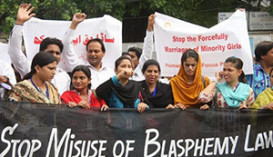
Some hope for Pakistani Christians as cleric announces willingness to review blasphemy law
According to reports, the chairman of the Council of Islamic Ideology, Muhammad Khan Sherani, has said that he is willing to review Pakistan’s harsh blasphemy laws.
The laws are regularly used to persecute Christians in Pakistan, leading to hundreds of innocent people being killed.
Pakistan’s religious and political elite almost universally keep clear of debating blasphemy laws in a country where criticism of Islam is a highly sensitive subject. Even rumours of blasphemy have sparked rampaging mobs and deadly riots.
But now Mr Sherani has reportedly said that he is willing to reopen the debate and see whether sentences as harsh as the death penalty were fair.
He added that the council could seriously consider the matter and give its recommendations on whether the law is too hash or soft, and whether it needs to be amended.
Pakistan’s blasphemy laws mandate the death penalty, although no sentence has been carried out. Poor, uneducated Christians are often targeted and falsely accused of blasphemy in order to settle personal scores.
To add to the anguish of minorities, judges are reluctant to hear blasphemy cases in court, and sometimes face threats if they are perceived to have acted favourably to a Christian.
But even if a Christian is acquitted of blasphemy, this does not mean their troubles have come to an end. They are often lynched – sometimes on their way back from court – with vigilantes dishing mob justice.
Salman Taseer, a prominent liberal politician, was killed by his own bodyguard in 2011 after he championed the cause of a Christian woman sentenced to death under the law.
Nasir Saeed, Director CLAAS-UK has said: “Although there is not much hope, the chairman’s comments are encouraging, as a few years back he was not even willing to discuss this law.
“But now he has expressed his willingness, it is a good sign. He has said the government of Pakistan should officially, at the government level, refer the law on committing blasphemy to the Council of Islamic Ideology. Although the council can only make recommendations, it is up to the government whether to accept and implement those recommendations.”
It is an established reality that the blasphemy law is being misused to settle personal scores and several religious scholars and politicians has even admitted this fact in the media.
Though there is a lot of difference of opinion among the clergy and the politicians. A significant number still believe this law is being misused, including the head of Tehreek e Insaf, Imran Khan, and Ejaz ul Haque, son of Zia ul Haque.
Mr Saeed added: “There is a need to bring changes to stop the law’s continuous misuse, or at least for safeguards to be introduced.
“We have seen in the past how ruthlessly this law has been misused against minorities, and even the Muslims. Christians consider this law a root cause of their persecution and have been demanding an amendment for years. Churches have been attacked, several Christian towns have been set on fire, and several innocent people have been killed extra judicially. But the government has failed to bring this law to the Parliament.
“However now that the chairman of the Council of Islamic Ideology has expressed his willingness, it seems an appropriate time, so the government must consider this offer and bring some changes to stop the ongoing misuse of the blasphemy laws.”


